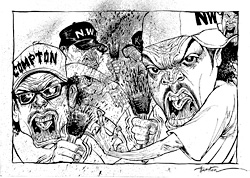In the summer of 1988, I was a 17-year-old heavy-metal fan sitting in the decrepit apartment of a friend and part-time pot dealer, wasting away another afternoon. Our usual bong-toking soundtrack consisted primarily of the ceiling-rattling, hard-rock staples of the time: Guns N’ Roses’ Appetite for Destruction, Jane’s Addiction’s Nothing’s Shocking, and the Cult’s Electric. My friend had grown tired of Axl, Perry, and Ian, and decided he’d treat our hazy circle to his latest discovery, Straight Outta Compton (reissued Dec. 4th), the sophomore release by a group from South Central Los Angeles who described their sound as “reality rap” and proudly explained their moniker, N.W.A. was an acronym for “Niggaz With Attidude.” “They have a song called “Fuck tha Police,” he exclaimed with a stutter of laughter, and slapped the cassette tape into his dusty stereo.
I was instantly mesmerized by the amount of energy that was coming forth with such minimal instrumentation and a handful of booming, authoritative voices. Ice Cube’s geographical introduction on the title track left nothing to the imagination about where things were going, but also served as a crude clarion call that I was about to get seriously schooled on what was happening to people living far out of my socioeconomic bracket.
The next day I woke up with the majority of the record firmly lodged in my head, my narrow worldview now refracted through the knowledge that sometimes really great art is absolutely terrifying. The misogyny was brutal and the merciless violence sounded all too real. But despite all the talk of slapping women around with “nine inches of limp dick,” the oddly glum, rudimentary gang rape, and the gleeful gunslinging, the element that hit me hardest was the bracing honesty. I appreciated that Eazy E and Ice Cube were being frank about their dismay. Whether it was the stupid motherfuckers smoking ‘caine or the racist police, they stood by their word. The state of the union was bleak.
Far outside my world, the shockwaves of SOC were being greeted as a welcome reflection for young men like Saturday Knights MC Barfly, who was relieved to finally hear his life experience committed to tape. “The album more than spoke to me,” he recalls. “The slang was regional and familiar, the topics were refreshingly lurid, and these guys sold their sense of humor with no smiley face on. It was like the rest of the world was starting to take notice of what was going on in our little part of the world. My life’s easily divided into two parts. Before Straight Outta Compton, and after.”
“The first time I heard thealbum I was in six or seventh grade, a preppy suburbanite living in Bellevue, and my mind was completely blown, to say the least,” recalls Light in the Attic label owner Matt Sullivan. “In the album’s first two seconds, the grit and intensity immediately devastated anything I heard before and practically everything I’ve heard since. The next time a record truly hit me like thatwould be Nirvana’s Nevermind.“
It would be an unfathomable stretch to say that SOC impacted Nevermind, but it’s a fact that Kurt Cobain appreciated that record enough to make it a tour-van staple in the band’s early days. “We met up with Nirvana for the ride down to San Jose,” recalls Sub Pop co-founder Jonathan Poneman. “Upon entering the van, we were immediately enthralled by the music. It was so commanding, hilarious, brutal, and nasty—we were instantly charmed! Both Bruce [Pavitt] and I were fans of Schoolly D, so the ‘gangsta’ genre wasn’t new per se. But the power and delivery was revolutionary.”
Common Market’s RA Scion sees the impact and endurance on a decidedly darker trajectory. “The fact that N.W.A.’s music continues to be relevant today is less a testament to the group’s staying power than it is to the harsh reality that, socially and politically speaking, shit hasn’t changed. Songs like “Dope Man” and “Fuck tha Police” are timeless classics because the crack game and police brutality continue to plague inner cities across America,” he asserts. “Sure, Cube had his finger on the pulse of South Central Los Angeles, but I tend to believe these dudes were rapping about conditions they believed, or at the very least hoped, would be resolved over the span of two decades. If anything substantial is to come out of [this] rerelease, it will be a renewed vigor in the interest of fixing what’s wrong with the economic system inside our country’s poorest communities—beginning with the real gangster-gangsters in D.C.”








